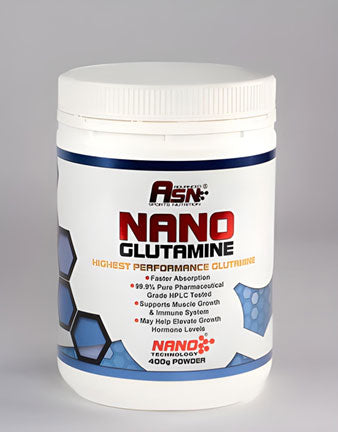Amino acids are the building blocks of life and play a critical role in muscle growth, recovery, and overall health. At ASN Advanced Sports Nutrition, we understand the importance of amino acids in optimising athletic performance and muscle repair. Whether you’re an elite athlete or just beginning your fitness journey, amino acids are essential for energy production, immune function, and protein synthesis. This guide explores what they are, why they matter, and how to integrate them into your diet for peak performance.
Table of Contents
- Key Takeaways
- What Are Amino Acids?
- Types of Amino Acids
- The Role of Amino Acids in the Body
- Food Sources of Amino Acids
- Amino Acids and Exercise
- Amino Acid Deficiencies
- Conclusion
- FAQs:
Key Takeaways
- Amino acids are essential for muscle growth, recovery, and overall health.
- They are classified as essential, non-essential, and conditional amino acids.
- BCAAs (Branched-Chain Amino Acids) play a crucial role in muscle repair and energy production.
- Amino acid supplementation can enhance performance, reduce fatigue, and support recovery.
- ASN Advanced Sports Nutrition offers high-quality amino acid supplements tailored for athletes and fitness enthusiasts.
What Are Amino Acids?
Amino acids are organic compounds that combine to form proteins, which are essential to almost every function in the body. Structurally, amino acids consist of a central carbon atom connected to an amino group (NH₂), a carboxyl group (COOH), a hydrogen atom, and a variable side chain (R group). It is the unique nature of this side chain that differentiates one amino acid from another.
Proteins are made up of long chains of amino acids, and these chains fold into specific shapes to carry out various functions. From forming muscles, skin, and hair to aiding in enzyme function, immune response, and neurotransmitter production, amino acids are integral to life.
Types of Amino Acids
There are 20 standard amino acids, divided into three categories based on how they are obtained and used by the body:
Essential Amino Acids
These amino acids are not produced by the body and must be obtained through diet. There are nine essential amino acids:
- Histidine
- Isoleucine
- Leucine
- Lysine
- Methionine
- Phenylalanine
- Threonine
- Tryptophan
- Valine
Since the body cannot produce these amino acids, they must be acquired through food sources like meat, eggs, dairy, and plant-based protein sources such as quinoa, soy, and legumes.
Non-Essential Amino Acids
These amino acids can be synthesised by the body, meaning they do not need to be obtained through diet. Examples include:
- Alanine
- Asparagine
- Aspartic acid
- Glutamic acid
- Serine
Even though the body can make these amino acids, they still play important roles in various physiological functions.
Conditional Amino Acids
Conditional amino acids are usually non-essential but can become essential under certain conditions, such as illness, stress, or injury. Examples include:
- Arginine
- Cysteine
- Glutamine
- Tyrosine
These amino acids may need to be obtained through diet or supplementation during periods of stress.
The Role of Amino Acids in the Body
Amino acids are vital for the proper functioning of the human body. Below are some of the critical roles they play:
- Protein Synthesis and Muscle Growth
Amino acids are the primary components of proteins, which form the structure of muscles, tissues, enzymes, and hormones. In particular, branched-chain amino acids (BCAAs) such as leucine, isoleucine, and valine are crucial for muscle protein synthesis, helping to stimulate muscle growth, repair, and recovery after exercise.
- Enzyme Production
Many enzymes in the body are proteins that are made from amino acids. These enzymes are necessary for processes such as digestion, energy production, and metabolism. Without amino acids, the body wouldn’t be able to produce the enzymes required for these essential biological functions.
- Neurotransmitter Function
Amino acids are also involved in the production of neurotransmitters, which are chemicals that transmit signals between nerve cells. For example, the amino acid tryptophan is a precursor to serotonin, a neurotransmitter that regulates mood, sleep, and appetite. Tyrosine, another amino acid, is involved in the production of dopamine, norepinephrine, and epinephrine, all of which affect mood, alertness, and focus.
- Immune System Support
Certain amino acids play an important role in immune function. Glutamine, for instance, is essential for the functioning of immune cells, especially during periods of illness or recovery. Amino acids help in the production of antibodies, which are essential for fighting off infections and maintaining a healthy immune system.
- Transport and Storage of Nutrients
Some amino acids act as carriers for various molecules within the body. For example, cysteine helps in the transport of sulfur, which is necessary for the production of antioxidants like glutathione, crucial for protecting cells from oxidative damage. Amino acids also assist in the transportation of nutrients across cell membranes.
Food Sources of Amino Acids
Since the body cannot produce essential amino acids, it’s important to ensure a balanced intake from dietary sources. High-quality protein foods such as:
- Animal-based sources: Chicken, turkey, beef, pork, fish, eggs, and dairy products like milk, cheese, and yogurt.
- Plant-based sources: Legumes (lentils, chickpeas, beans), soy products (tofu, tempeh, edamame), quinoa, nuts, seeds, and whole grains like brown rice and oats.
For those following vegetarian or vegan diets, it’s important to combine plant-based protein sources to ensure all essential amino acids are consumed, as some plant proteins may lack one or more essential amino acids. For example, pairing rice with beans or hummus with whole-grain pita can provide a complete protein profile.
Amino Acids and Exercise
Amino acids, particularly BCAAs (branched-chain amino acids), are incredibly important for anyone engaged in physical activity, as they play a significant role in muscle repair and recovery. When you exercise, particularly in strength training or endurance sports, your muscles undergo wear and tear. Consuming amino acids before or after a workout can help promote muscle recovery and reduce muscle soreness.
BCAAs, in particular, have been shown to:
- Promote muscle protein synthesis and aid in muscle repair.
- Reduce muscle fatigue by lowering the production of serotonin, which can make you feel tired during exercise.
- Decreases muscle soreness after intense workouts, allowing for faster recovery.
Some athletes also turn to amino acid supplements or protein powder, which often contains a rich blend of essential amino acids, including BCAAs.
Amino Acid Deficiencies
While amino acids are vital to overall health, deficiencies in certain amino acids can lead to a variety of issues. For example, a lack of essential amino acids due to a poorly balanced diet can impair muscle growth and recovery, decrease immune function, and hinder neurotransmitter production, potentially leading to mood disorders like depression.
Amino acid deficiencies are relatively rare in people who eat a balanced diet, but certain conditions such as malnutrition, illness, or restricted diets may lead to insufficient intake. In these cases, supplementation may be necessary to restore balance and ensure the body functions optimally.
Conclusion
Understanding amino acids is fundamental to optimising health and performance. Whether through diet or supplementation, ensuring adequate intake supports muscle development, immune function, and overall well-being. For personalised advice and high-quality supplements, contact ASN Advanced Sports Nutrition. Our team is dedicated to helping you achieve your health and fitness objectives.
FAQs:
Why are amino acids important for athletes?
Amino acids support muscle repair, endurance, and overall recovery, making them essential for athletes and active individuals.
What are the best amino acids for muscle growth?
BCAAs (Leucine, Isoleucine, and Valine) are the most effective for promoting muscle protein synthesis and reducing muscle breakdown.
Can I get enough amino acids from food alone?
While whole foods provide amino acids, supplementation ensures adequate intake for active individuals and athletes with higher protein needs.
When is the best time to take amino acid supplements?
For best results, take amino acids before, during, or after workouts to enhance performance, prevent muscle breakdown, and speed up recovery.
Do amino acids help with fat loss?
Yes, L-Carnitine and certain BCAAs aid in fat metabolism while preserving lean muscle mass.
Where can I buy high-quality amino acid supplements?
Find premium ASN Advanced Sports Nutrition amino acid supplements.

